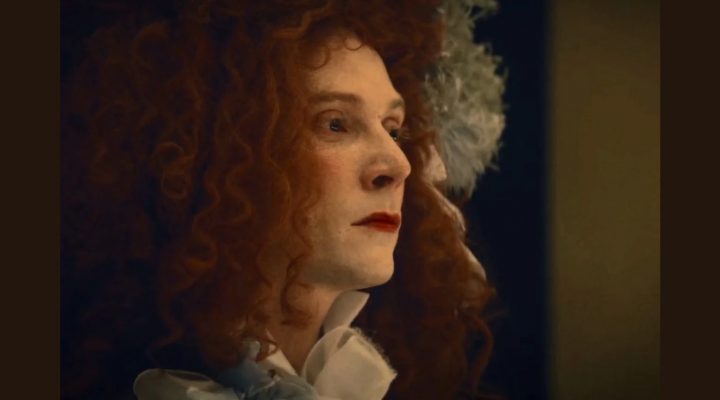The Apple+ series Franklin — with Michael Douglas as Benjamin Franklin, one of America’s most influential founding fathers and the new Republic’s first ambassador to France — has historical significance.
The story features the eight years, beginning in 1776, during which Franklin attempted to cajole the young French King Louis XVI to help the American Revolution with money, guns and ammunition, ships and soldiers. In 1778, France signed a Treaty of Alliance with fledgling America promising support for the effort to overthrow the British, which led to Great Britain’s declaration of war on France that same year.
In the third episode of Franklin, Benjamin and his grandson Temple attend an opera in Paris. Before the orchestra begins, a special celebrity is introduced on stage – the Chevalier d’Eon, a French soldier who had fought in the Seven Years’ War and been a spy for France in both England and Russia. Regarded a hero, he is nonetheless a mystery to the opera house audience, because he is wearing a dress, facial cosmetics and a woman’s wig.

Michael Douglas and Noah Jupe in “Franklin” (IMDB)
Expressing joy to be back in his homeland d’Eon calls attention to “another great patriot, Dr. Benjamin Franklin.” Speaking directly to Franklin in the audience, he says: “In the last war, our countries were enemies. I hope they will soon be united against England. My arms, in the cause of America, are at your service.”
Spurred by the recognition, Franklin stands to respond: “The chevalier is most generous. And I am honored that such a brave soldier of France would offer assistance to our cause. Should her sword be required, I would gladly seize the …”
“He wants to seize her sword!” someone taunts from the crowd, and raucous laughter erupts throughout the audience. The chevalier, on stage, stands quietly with head down, while Franklin, embarrassed by his misinterpreted words, sits down, clearly shaken by the laughter and jeering from the Parisian elite — stylish in their silk garments and powdered wigs yet raucous and uncivil.
Later that evening, outdoors, Franklin encounters the chevalier. After apologizing for misspeaking — to which d’Eon graciously replies, “You misspoke? I do have a sword” — Franklin awkwardly offers, “You must be pleased to return home.”
“I’ve been called a traitor and worse, outlawed and exiled. And I also have been mocked.”
“We shall see,” says the chevalier. “Everywhere, I’ve had to battle for my reputation. I’ve been called a traitor and worse, outlawed and exiled. And I also have been mocked.”
To this genuine self-revelation, Franklin admits: “I must confess … I take it more poorly than most. There’s a pride in me that I sometimes think unseemly.”
Then d’Eon responds: “Me, as well, doctor. And that is why I will never let them defeat me, no matter what.”
Tentatively, Franklin inquires: “Chevalier, may I ask … purely in the spirit of knowledge …”
“What I am?” interrupts d’Eon. “I am a fact … that does not yet have a name.”
The Chevalier d’Eon was a real person, one of many historical figures who appear in this story alongside Benjamin Franklin. Born in France, d’Eon was one of the most colorful figures of 18th-century Britain, living in London from 1762 to 1777 as a man, and from 1785 to 1810 as a woman. After 1785, there was considerable speculation in England about the chevalier’s gender. Rumors on both sides of the English Channel turned to prurient interest and occasional public derision.
Back to the future
“I am a fact … that does not yet have a name.”
The words are undoubtedly those of the contemporary screenwriter, but the spirit of the sentiment — as exposed in numerous historical treatments of the Chevalier d’Eon and his gender fluidity — fairly conveys what this human being must have felt. The Chevalier d’Eon claimed to have been born as a girl but raised as a boy by an insistent father. Yet, despite becoming a highly regarded French dragoon and diplomat, wearing a military uniform as a man, d’Eon continued to long to be recognized as a woman.
When Louis XVI ascended the French throne in 1774, the chevalier offered the new king all the secret papers from years of spying, in exchange for a pension and the right to live and be regarded as a woman. The terms were granted, with the stipulation that from that moment on d’Eon would dress in women’s clothes and be known as a woman.
Years later, at the time of d’Eon’s death, a coroner discovered the corpse to have the physical anatomy of a male.
“His reality was misunderstood, ridiculed, whispered about, rejected, laughed at and questioned, but unnamed.”
Numerous autobiographical records of d’Eon verify that the chevalier was a transgender person, although in the 18th century, this reality was not understood, nor did it have a name. He was a fact for whom there was not yet a name. His reality was misunderstood, ridiculed, whispered about, rejected, laughed at and questioned, but unnamed.
Today, we understand the plight of the chevalier to be gender dysphoria, defined by the Mayo Clinic as “the feeling of discomfort or distress that might occur in people whose gender identity differs from their sex assigned at birth or sex-related physical characteristics.” We furthermore accept that he was not a cross-dresser, a transvestite or a drag queen, but was genuinely transgender, explained by the American Psychological Association as “an umbrella term for persons whose gender identity, gender expression or behavior does not conform to that typically associated with the sex to which they were assigned at birth.”
Disappointing reactions
Regardless of these contemporary explanations by respected medical experts of gender dysphoria as legitimate psychological and biological conditions — a fact of life for some people — there are surprising and deeply disappointing reactions by many religious individuals and groups.
These Christians and their institutions feel the cultural shift to acceptance for transgender identity poses a real dilemma. A recent Pew Research Center report showed the Episcopal Church and the United Church of Christ support full inclusion of transgender people, including their ordination for ministry, while the Assemblies of God and the Southern Baptist Convention “officially (discredit) transgender identity and reject attempts by current or potential adherents to change or disagree with their biological sex.”
Mark Yarhouse, a licensed clinical psychologist and professor, in his book Understanding Gender Dysphoria: Navigating Transgender Issues in a Changing Culture, says he has witnessed the isolation and depression felt by those experiencing gender dysphoria. He further charges that many Christians label those who suffer from this medical condition as willfully disobedient to God’s intentional creation of people as either male or female.
His findings explicitly mirror the conservative reaction to transgender identity from two conservative websites. First, the Journal of Reformed Theological Seminary in Charlotte, N.C., features an article by James Anderson, a professor of theology and philosophy at the school, who summarizes:
- The transgender movement is merely the latest phase of a moral and cultural revolution which is grounded in secular worldviews committed to human autonomy and thus to a wholesale repudiation of the God of the Bible.
- While we must hold fast to the biblical truth that every human being is made in the image of God and precious in God’s sight, we must also affirm that every human being — every last one of us — is fallen in sin and sexually broken. Gender dysphoria and other forms of gender confusion are but one manifestation of that sexual brokenness.
The other site is James Dobson’s Focus on the Family, whose “issue analysts” say:
- We affirm God’s design for the two sexes — male and female — and marriage between one man and one woman as the place God established for sexual love to occur.
- We disagree with revisionist gay and transgender theologies as contradictory to foundational Christian doctrine and the Judeo-Christian sexual ethic.
- We oppose the ordination of “transgender” and “transsexual” individuals into the clergy and the celebration of “transgenderism” as one of God’s gifts
These specific responses are consistent with a wider Pew Research Center study which found that among adults in the United States, six in 10 declare one’s gender is “determined by their sex assigned at birth.”
Politically speaking, the question should be asked why the GOP is escalating its attacks on transgender rights. According to a PBS report, multiple surveys reveal many Americans, including Republicans, support LGBTQ equality, yet in the last few years red states have passed numerous anti-LGBTQ bills, especially anti-trans legislation.
Geoff Wetrosky of the Human Rights Campaign warns there’s a reason why anti-trans bills are so prevalent. He says, “Even as (the number of white evangelicals has) shrunk as part of the population, (they) are still showing up to vote in disproportionate numbers.”
Much of the success of creating that powerful voting bloc is the fear of cultural changes — including transgender identity — that has been so reinforced.
A few celebrities
There are, however, a few transgender celebrities who are lifted up to public praise. These include Caitlyn Jenner, American decathlon champion and 2015 winner of the Arthur Ashe courage award as an individual “whose contributions ‘transcend sports”; Chilean transgender actress and mezzo-soprano Daniela Vega-Hernandez who won critical acclaim for her starring role in the Academy Award-winning film A Fantastic Woman and was the first trans person to present an award at the Oscars in 2018; and, more recently, Geena Rocero, “model, author, transgender rights activist and film producer” who was named a 2023 Woman of the Year by Glamour Magazine.
Occasionally, specific transgender people like these three, much like the Chevalier ‘dEon, have been accepted as celebrities. But America has a tragic record of the general mistreatment of transgender people.
Sadly, they are often harassed and even become victims of violence, according to a Human Rights Watch report titled “I Just Try to Make it Home Safe: Violence and the Human Rights of Transgender People in the United States.”
Ryan Thoreson, an LGBTQ rights researcher at Human Rights Watch, says that “every year, advocates document dozens of cases of fatal violence against transgender people.” This is especially true of Black transgender women, who are so often violated by strangers, partners, family members and law enforcement officers.
The Williams Institute, in the law school of UCLA, corroborates this data, finding that “transgender people are over four times more likely than cisgender people to experience violent victimization, including rape, sexual assault and aggravated or simple assault.”
The Chevlier d’Eon fictitiously said, “I am a fact … that does not yet have a name.” But today we have a name for people like her.
It is no fiction, however, that 250 years later in a nation that prides itself on “life, liberty and the pursuit of justice” for all, we still treat people like ‘dEon with suspicion, contempt, pity and judgmentalism.
Rob Sellers is professor of theology and missions emeritus at Hardin-Simmons University’s Logsdon Seminary in Abilene, Texas. He is a past chair of the board of the Parliament of the World’s Religions in Chicago. He and his wife, Janie, served a quarter century as missionary teachers in Indonesia. They have two children and five grandchildren.
Related articles:
The transgender obsession | Opinion by Martin Thielen
Focus on the Family affiliate is the unifying force behind campaign to restrict transgender rights
Why being transgender is not a sin | Opinion by Mark Wingfield
“The Baptist Pastor and His Transgender Friends” | TEDx Talk by Mark Wingfield


